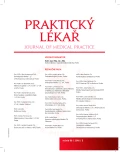-
Medical journals
- Career
Diabetic cancer patients in palliative hospice care
Authors: M. Kala 1,2; K. Loyková 3
Authors‘ workplace: Ústav zdravotnických věd, Fakulta humanitních studií, Univerzita Tomáše Bati ve Zlíně Ředitelka: Mgr. Zlatica Dorková, Ph. D. 1; Hospic na Svatém Kopečku, Olomouc Vedoucí lékař: doc. MUDr. Miroslav Kala, CSc. 2; III. interní klinika, Fakultní nemocnice Olomouc Přednosta: prof. MUDr. Josef Zadražil, CSc. 3
Published in: Prakt. Lék. 2016; 96(5): 235-237
Category: Of different specialties
Overview
As a result of growth in the number of diabetics, there are increasingly frequent cases of patients in terminal stages of severe illnesses who are being treated with oral antidiabetic agents or insulin. An overview of current opinions on managing the treatment of diabetics in palliative care is given. As a result of a deteriorated nutritional situation and cachexia, it is essential to reduce or discontinue oral antidiabetic agents, or reduce or completely discontinue insulin doses, and not insist on optimal diabetes control. The objective of treating diabetes in advanced stages of incurable diseases is no longer to prevent later diabetes complications, but rather to prevent the development of hypoglycaemia and overt hyperglycaemia.
Keywords:
diabetes – palliative care – hospice – terminal stages – end of life
Sources
1. Dionisio R, Giardini A, De Cata P, et al. Diabetes management in end of life: A preliminary report stemming from clinical experience. Am J Hosp Palliat Care 2015; 32 : 588–593.
2. Ford-Dunn S, Smith A, Quin J. Management of diabetes during the last days of life: attitudes of consultant diabetologists and consultant palliative care physicians in the UK. Palliative Medicine 2006; 20 : 197–203.
3. Jacob P, Chowdhury TA. Management of diabetes in patients with cancer. Q J Med 2015; 108 : 443–448.
4. Kabelka L, Sláma O. Poruchy metabolismu glukózy u pokročile a terminálně nemocných. In: Sláma O, Kabelka L, Vorlíček J, a kol. Paliativní medicína pro praxi. Praha: Galén 2007.
5. King EJ, Haboubi H, Evans D, et al. The management of diabetes in terminal illness related to cancer. Q J Med 2012; 105 : 3–9.
6. Kondo S, Kondo M, Kondo A. Glycemia control using A1C level in terminal cancer patients with preexisting type 2 diabetes. J Palliat Med 2013; 16 : 790–793.
7. McCoubrie R, Jeffrey D, Paton C, Dawes L. Managing diabetes mellitus in patients with advanced cancer: a case note audit and guidelines. Eur J Cancer Care 2005; 14 : 244–248.
8. Munshi MN, Florez H, Huang ES, et al. Management of diabetes in long term-care and skilled nursing facilities: A position statement of the American diabetes association. Diabetes Care 2016; 39 : 308–318.
9. Poulson J. The management of diabetes in patients with advanced cancer. J Pain Symptom Manage 1997; 13 : 339–346.
10. Rowles S, Kilvert A, Sinclair A. ABCD position statement on diabetes and end of life care. Pract Diab Int 2011; 28 : 26–27.
11. Sláma O, Vorlíček J. Základní principy paliativní péče. In: Sláma O, Kabelka L, Vorlíček J, a kol. Paliativní medicína pro praxi. Praha: Galén 2007.
12. Warren RE, Deary IJ, Frier BM. The symptoms of hyperglycaemia in people with insulin treated diabetes: classification using principal components analysis. Diabetes Metab Res Rev 2003; 19 : 408–414.
Labels
General practitioner for children and adolescents General practitioner for adults
Article was published inGeneral Practitioner

2016 Issue 5-
All articles in this issue
- Intervention of occupational therapist in adult patients with neurogenic dysphagia
- Research of opinions and attitudes of Czech citizens to general practitioners
- Patients with Alzheimer’s dementia in the context of family care
- Assessment of invalidity of diabetic patients
- Diabetic cancer patients in palliative hospice care
- General Practitioner
- Journal archive
- Current issue
- Online only
- About the journal
Most read in this issue- Assessment of invalidity of diabetic patients
- Intervention of occupational therapist in adult patients with neurogenic dysphagia
- Patients with Alzheimer’s dementia in the context of family care
- Diabetic cancer patients in palliative hospice care
Login#ADS_BOTTOM_SCRIPTS#Forgotten passwordEnter the email address that you registered with. We will send you instructions on how to set a new password.
- Career

